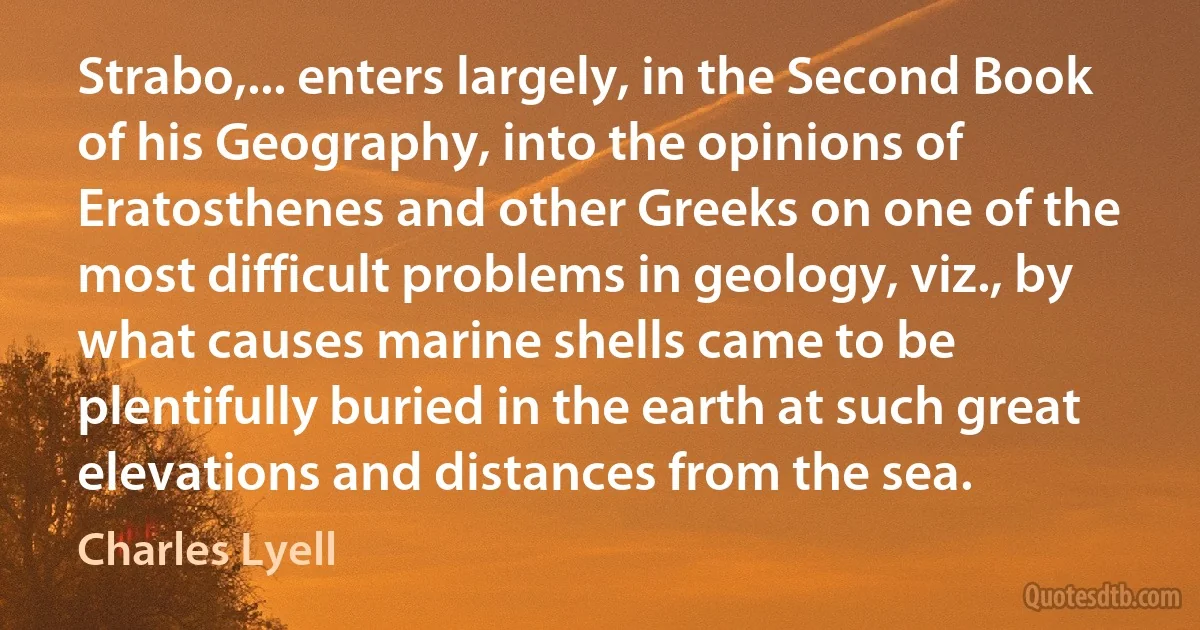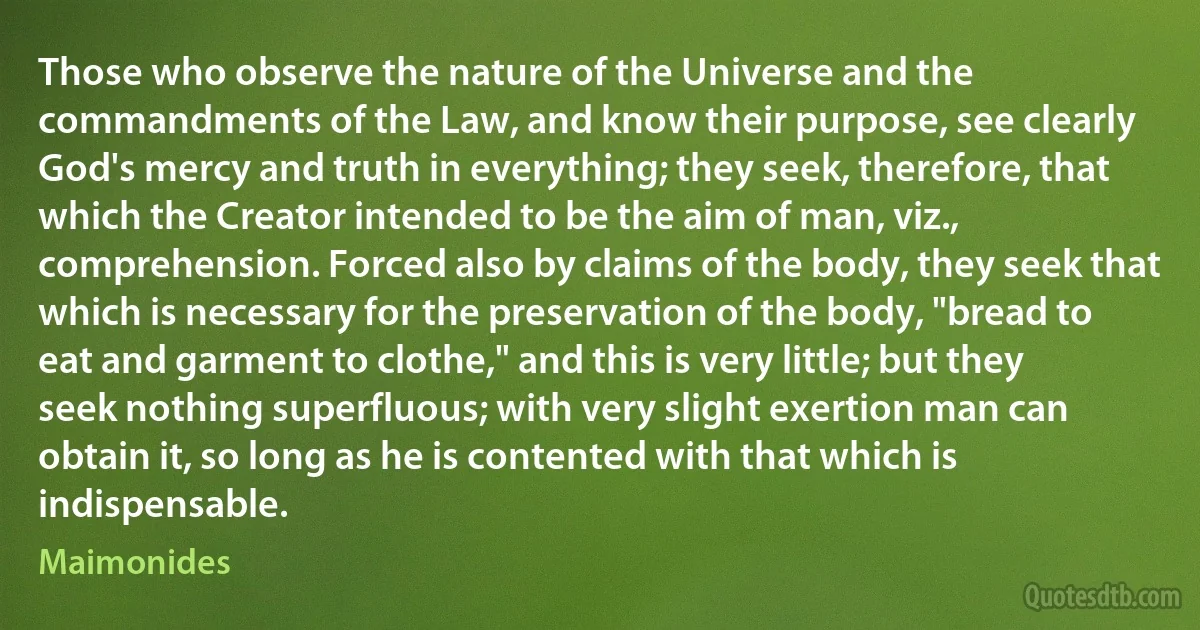Viz Quotes - page 3
Those who observe the nature of the Universe and the commandments of the Law, and know their purpose, see clearly God's mercy and truth in everything; they seek, therefore, that which the Creator intended to be the aim of man, viz., comprehension. Forced also by claims of the body, they seek that which is necessary for the preservation of the body.

Maimonides
Some consider... all wants of the body as shame, disgrace, and defect to which they are compelled to attend; this is chiefly the case with the sense of touch, which is a disgrace to us according to Aristotle, and which is the cause of our desire for eating, drinking, and sensuality. Intelligent persons must, as much as possible, reduce these wants, guard against them, abstain from speaking of them, discussing them, and attending to them in company of others. Man must have control over all these desires, reduce them as much as possible, and only retain of them as much as is indispensable. His aim must be the aim of man as man, viz., the formation of ideas, and nothing else. The best and sublimest among them is the idea which man forms of God, angels, and the rest of the creation according to his capacity. Such men are always with God, and of them it is said, "Ye are princes, and all of you are children of the Most High."

Maimonides
From time to time a square has been opened here, a park there, a street cut through in one place or widened in another, but these improvements have been entirely local in their effect, and have failed to change the general appearance of the city. Even the greatest of all these changes, the laying out of Central Park, was unfortunate, to say the least, for it serves to aggravate one of the worst features of the original plan, viz., the failure to provide a central artery of communication worthy of the coming city.

Ernest Flagg
!-- A motion was made and seconded, that the report of the Committee made on Monday last, be amended, so far as to add the following to the first article therein mentioned, viz.: ' -->And that the said Constitution be never construed to authorize Congress to infringe the just liberty of time press, or the rights of conscience; or to prevent the people of the United States, who are peaceable citizens, from keeping their own arms; or to raise standing armies, unless when necessary for the defence of the United States, or of some one or more of them; or to prevent the people from petitioning, in a peaceable and orderly manner, the federal legislature, for a redress of grievances; or to subject the people to unreasonable searches and seizures of their persons, papers or possessions.

Samuel Adams
That it is a perfect absurdity to suppose that any body of men would ever take a man's money without his consent, for any such object as they profess to take it for, viz., that of protecting him; for why should they wish to protect him, if he does not wish them to do so? To suppose that they would do so, is just as absurd as it would be to suppose that they would take his money without his consent, for the purpose of buying food or clothing for him, when he did not want it.

Lysander Spooner
If it be said that the consent of the strongest party in a nation, is all that is necessary to justify the establishment of a government that shall have authority over the weaker party, it may be answered that the most despotic governments in the world rest upon that very principle, viz.: the consent of the strongest party.

Lysander Spooner
He then goes a step further and briefly imposes a Freudian reading on the text, a reading outdated and crude even in the current Western context of cultural criticism. He says the depiction of 'the other' in Ramayana can be understood as a projection of the unfulfilled sexual desires of traditional Indians. .... The motive of applying a totally alien framework, viz., the Freudian one, to a traditional Hindu text is something that is questionable.

Rajiv Malhotra
It will be remembered, that the object of the several states in the adoption of that instrument, was not the establishment of a general consolidated government, which should swallow up the state sovereignties, and annihilate their several jurisdictions, and powers, as states; but a federal government, with powers limited to certain determinate objects; viz. their intercourse and concerns with foreign nations; and with each other, as separate and independent states; and, as members of the same confederacy: leaving the administration of their internal, and domestic concerns, to the absolute and uncontrolable jurisdiction of the states, respectively; except in one or two particular instances, specified, and enumerated in the constitution.

St. George Tucker
I have learned by experience that there is but one God that pertains to this people, and He is the God that pertains to this earth-the first man. That first man sent his own Son to redeem the world, to redeem his brethren; his life was taken, his blood shed, that our sins might be remitted. That Son called twelve men and ordained them to be Apostles, and when he departed the keys of the kingdom were deposited with three of those twelve, viz.: Peter, James, and John. Peter held the keys pertaining to that Presidency, and he was the head.

Heber C. Kimball
Truth, then, seems to me, in the proper import of the word, to signify nothing but the joining or separating of Signs, as the Things signified by them do agree or disagree one with another. The joining or separating of signs here meant, is what by another name we call proposition. So that truth properly belongs only to propositions whereof there are two sorts, viz. mental and verbal as there are two sorts of signs commonly made use of, viz. ideas and words.

John Locke
The genuine safety-principle of true religion is contrariwise as follows. Whatever is a mean or condition of future bliss, unknown to naked reason, and promulgated singly by revelation, can strike root in my conviction, just like any other history; and so far forth as it does not militate against morality, cannot be absolutely false. Besides leaving this point totally undecided, I may unquestionably trust, that whatever of salutary there may lie in a document, will stand me in good stead, provided I do not by my moral short-coming make myself unworthy of it. In this maxim, there is a real moral safety, viz. That conscience be not violated; and more cannot be demanded from mankind. There is, moreover, an utmost danger and insecurity in that lauded stratagem of expediency, whereby we think astutely to evade any disadvantageous sequents that may spring from unbelieving nonconformity. Thus tampering with either party, we destroy our credit with both.

Immanuel Kant
That miracles are things in themselves possible, must be allowed so long as it is evident that there is in nature a power equal to the working of them. And certainly the power, principle, or being, by whatever name it be denominated, which produced the universe, and established the laws of it, is fully equal to any occasional departures from them. The object and use of those miracles on which the christian religion is founded, is also maintained to be consonant to the object and use of the general system of nature, viz. the production of happiness. We have nothing, therefore to do, but to examine, by the known rules of estimating the value of testimony whether there be reason to think that such miracles have been wrought, or whether the evidence of Christianity, or of the christian history, does not stand upon as good ground as that of any other history whatever.

Joseph Priestley
Tribal endogamy explains the Hindu caste system. As Vedic society, an advanced and differentiated society characterized by class (varna) hierarchy, expanded from the Northwest into India's interior, it absorbed ever more tribes but allowed them their distinctive traditions and first of all their defining tradition, viz. their endogamy. This way, endogamous self-contained units or tribes became endogamous segments of Hindu society, or castes.

Koenraad Elst
It is in this context that in 1940, Savarkar launched his slogan: "Hinduize all politics, militarize Hindudom.” This slogan is nowadays often quoted out of context to impute to Savarkar a fascist-like fascination with "war for war's sake”. But it meant nothing of the kind. He wanted Hindus to get military experience for a specific purpose, viz. that after the war, England would find a vast number of combat-ready Indian troops before her...

Koenraad Elst
The first part of South Asia to be cleansed of Hinduism was Afghanistan. The 10 th century saw a life-and-death struggle there between Muslim invaders and the local Hindu population and dynasty. In this case, the replacement was not just religious, of Hindus by Muslims, but also ethnic, viz. of Indo-Aryans by Iranians. The fact of an at least partial physical replacement of the native population by invaders is attested by the linguistic shift. Until then, in much of the present-day Pashtu-speaking region of Pakistan and Afghanistan, an Indo-Aryan Prakrit was spoken (remember how the Sanskrit grammarian Panini was a native of Peshawar). It was replaced with Pashtu, an Iranian language.

Koenraad Elst



